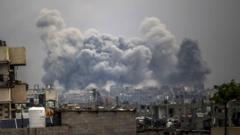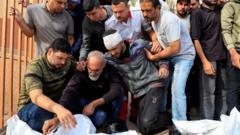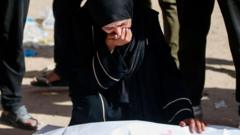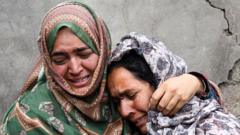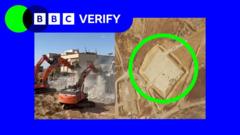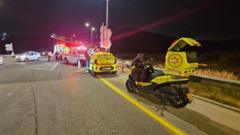"With military action intensifying and blockades continuing, Gazans face severe food shortages, impacting families' well-being. Reports reveal children like Ismail cry from hunger, while parents express helplessness in providing for their families."
"Desperation in Gaza: Families Face Hunger Amid Ongoing Blockade"
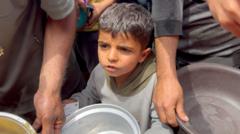
"Desperation in Gaza: Families Face Hunger Amid Ongoing Blockade"
"Children go to bed hungry as families struggle to find food and medicine, revealing a dire humanitarian crisis in Gaza."
As Gazans confront dwindling food supplies and rampant hunger, the humanitarian crisis becomes increasingly acute. Children are going to bed with empty stomachs, and families are left in despair as military actions escalate and blockades tighten, complicating food access and basic necessities.
In one harrowing instance, six-year-old Ismail Abu Odeh desperately pleaded for food at a distribution point in northern Gaza, only to have the meager lentils he received knocked out of his hands. With no deliveries of food or water coming to the displacement camp where he stays, he returned to his family in tears—a heartbreaking sight reflecting the dire conditions many residents face.
The BBC has been gathering testimonials from individuals across Gaza, where an escalating military siege and a near-total blockade on food and medical supplies have left marks of desperation on the populace. The United Nations has issued urgent warnings regarding impending famine, even as the Israeli government pushes back against claims of food shortages, attributing the crisis to Hamas's actions.
Yet the reality painted by those on the ground starkly contrasts with such assertions. Residents report significant challenges in securing even a single meal a day. Food kitchens are shuttering due to severe shortages, and market prices for available goods are inflating to unsustainable levels, further straining families.
Adham al-Batrawi, displaced from his former home, shared his struggle with hunger, expressing how inventive cooking methods have become necessary for survival. Meanwhile, medical professionals are confronting a separate crisis—hospitals are facing debilitating shortages due to the blockade, and the safety of medics is being jeopardized by strikes on medical facilities, rendering them less capable of providing care.
One nurse detailed the horror of witnessing her workplace being struck, describing the moment as one of “pure terror.” Despite these obstacles, medics vow to continue their work out of duty to their patients, who are as much part of the community as their care teams.
As the situation continues unabated, Gazans like Ismail's father express their grief and helplessness, noting, "My children go to sleep hungry." The humanitarian landscape in Gaza remains a complex and heartbreaking narrative, one that draws concerns both regionally and internationally concerning the necessity of urgent aid and support.

